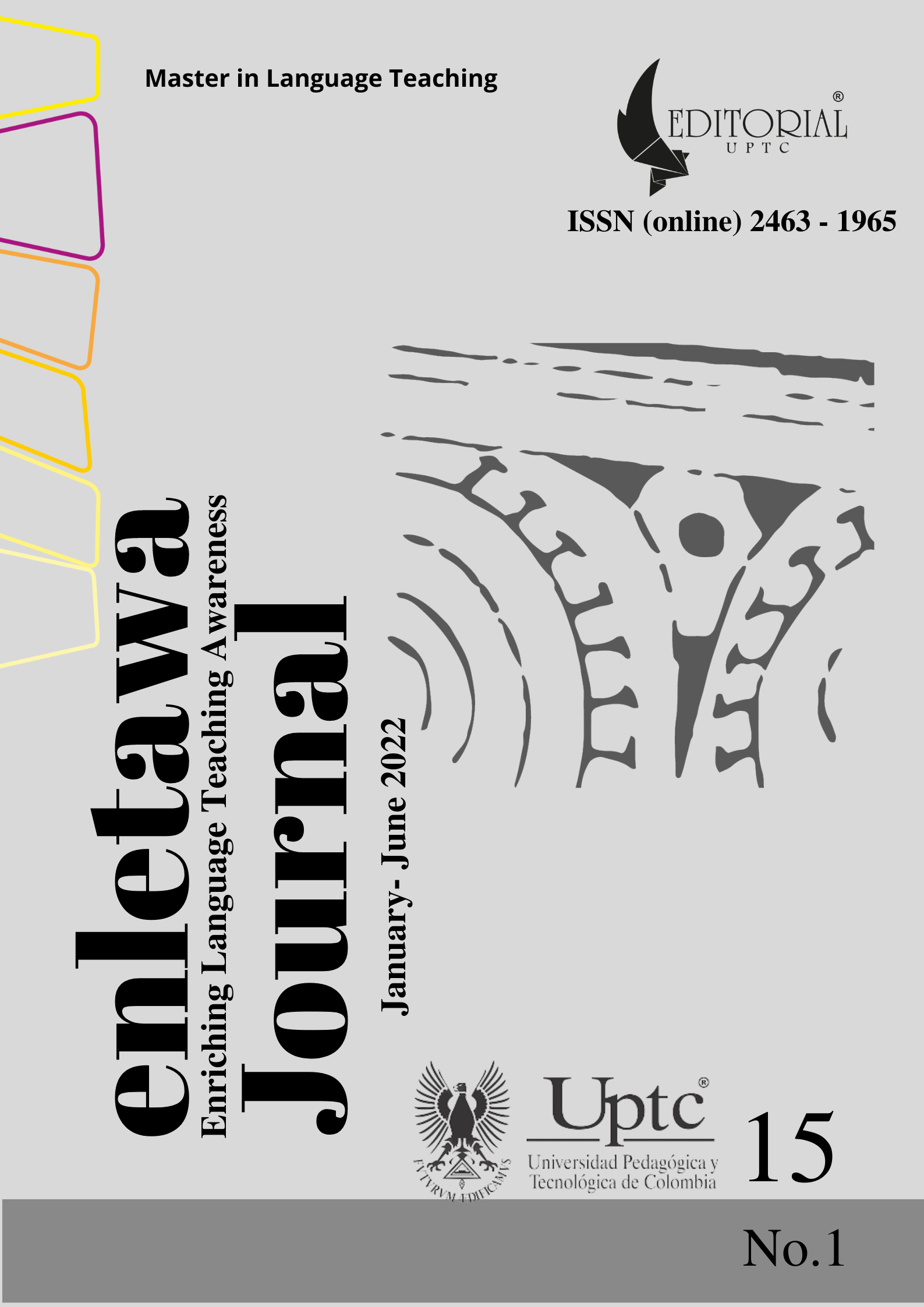Gamification to Engage Young Learners in the English Class

Abstract
In this action research, our purpose was to carry out a pedagogical intervention in the English class using the Gamification method with first grade children in a private bilingual school. In the needs analysis we identify aspects that emerge from learning such as lack of motivation or disinterest and low development in listening and speaking skills. The study is based on the questions, How does gamification support children's English skills? And What is the role of gamification in student engagement? We focus on three theoretical constructs: significant learning, young learners and gamification, taking into account authors such as Rieber (1996); Delgado and Breña, (2022), Ospina (2006), among others. When analyzing field notes and video transcripts, the results show that there was active participation, continuous student learning, greater interest in exploring, and confidence to ask unknown topics without fear. The development of listening and speaking skills was evidenced when recognizing, pronouncing and associating meanings in English and Spanish. The children expressed their knowledge, worked as a team with their peers, and there was commitment from the students
Keywords
Gamification, motivation, meaningful learning, young learners, speaking, listening, pedagogical intervention, action research
Author Biography
Luisa Fernanda Barbosa Alfonso
Active student from Bachelor in Bilingualism. Universidad El Bosque
Juliana Dueñez Castro
Active student from Bachelor in Bilingualism
Diana Patiño Flórez
Active student from Bachelor in Bilingualism
Judith Castellanos Jaimes
Full-time professor at the School of Education at Universidad El Bosque. She holds an M.A. in Applied Linguistics to TEFL from Universidad Distrital Francisco José de Caldas and a B.A in Languages from Universidad Industrial de Santander Colombia
References
- Arauna, A. (s,f). Aprendizaje significativo: Un concepto Subyacente.. Academia Accelerating the world’s research. Retrieved April 8, 2021, from
- https://www.academia.edu/19688251/APRENDIZAJE_SIGNIFICATIVO_UN_CONCEPTO_SUBYACENTE?bulkDownload=thisPaper-topRelated-sameAuthor-citingThis-citedByThis-secondOrderCitations&from=cover_page
- Ballester, A. (2014, noviembre). Meaningful learning in practice. Journal of Education and Human Development. Retrieved March 3, 2022, from DOI: https://doi.org/10.15640/jehd.v3n4a18
- https://antoniballester.com/wp-content/uploads/2017/03/Pdf-1.pdf
- Belén, L. (2017). Enseñar inglés como LE en un contexto educativo diverso de Mallorca: Un cambio de mirada hacia la multiculturalidad. Universitat de les Illes Balears. Retrieved October 14, 2022,from https://dspace.uib.es/xmlui/bitstream/handle/11201/147431/Marino_Lucia_Belen.pdf?sequence=1&isAllowed=y
- Bryman, A. (2016). Social Research Methods. Oxford. Retrieved October 13, 2022, from https://ktpu.kpi.ua/wp-content/uploads/2014/02/social-research-methods-alan-bryman.pdf
- Delgado, G. & Breña, L. (2022, 24 junio). Percepciones de docentes y estudiantes universitarios de octavo ciclo sobre el uso del flipped classroom y gamificación en modalidad virtual en la facultad de educación de una universidad privada de lima. Universidad Peruana de Ciencias Aplicadas. Retrieved October 2, 2022, from https://repositorioacademico.upc.edu.pe/bitstream/handle/10757/660954/Delgado_OG.pdf?sequence=3
- Deterding, S., Dixon, D., Khaled, R. & Nacke, L. (2011, 28 septiembre). From Game Design Elements to Gamefulness: Defining “Gamification”. Retrieved October 4, 2021, from DOI: https://doi.org/10.1145/2181037.2181040
- https://dl.acm.org/doi/pdf/10.1145/2181037.2181040
- GameLearning. (2014, 15 julio). RUA: Gamificar una propuesta docente. Diseñando experiencias positivas de aprendizaje. http://rua.ua.es/dspace/handle/10045/39195
- Gallego, R. (2008). Metodologías para la Investigación en Gestión de Operaciones. ETSI Industriales https://oa.upm.es/1143/1/CARRASCO_01_2007.pdf
- Haagenson, Heidi (2016). Engaging All Students: Strategies to Promote Meaningful Learning and Increase Academic Performance. St. Catherine University. https://sophia.stkate.edu/cgi/viewcontent.cgi?article=1200&context=maed
- Hamilton, L. (2011). Case studies in educational research. BERA. Recuperado 1 de septiembre de 2022, de https://www.bera.ac.uk/publication/case-studies-in-educational-research
- Heale, R. & Forbes, D. (2013). Understanding triangulation in research. Academia Accelerating the world’s research. Retrieved October 13, 2022, from https://www.academia.edu/49038457/Understanding_triangulation_in_research?from=cover_page
- Hernández, R. (2014, April). Metodologia de la Investigacion. https://proyectos.javerianacali.edu.co/cursos_virtuales/posgrado/maestria_asesoria_familiar/Investigacion+I/Material/31_Hern%C3%A1ndezSampieri_MetInv_406a470.pdf
- Lynch, M. (2017, 18 Marzo). How Does Gamification Effect the Learning Process? The Edvocate. https://www.theedadvocate.org/how-does-gamification-effect-the-learning-process/
- Macías-Mendoza, F. E. (2017, 28 diciembre). Estrategias metodológicas para mejorar las habilidades de speaking y listening en idioma inglés en la escuela de educación básica de universidad laica Eloy Alfaro de Manabí | Macías-Mendoza | Dominio de las Ciencias. Retrieved October 14, 2022, from DOI: https://doi.org/10.23857/dc.v3i4.714
- https://dominiodelasciencias.com/ojs/index.php/es/article/view/714
- Maloney, S. (2020, 27 Marzo). Gamification in English language teaching: more than child’s play. TESOL. Retrieved September 21, 2022, from https://hongkongtesol.com/blog/2019/07/gamification-english-language-teaching-more-childs-play
- Martina, F., Syafryadin, Saputra, J., & Rakhmanina, L. (2020, 15 junio). Novice Teacher’s Pedagogical Content Knowledge (PCK) In Teaching English for Toung Learners. Journals of Critical Reviews. Retrieved October 5, 2022, from
- http://www.jcreview.com/fulltext/197-1596367904.pdf?1633502039
- MetaFlip. (n.d). Retrieved October 17, 2022, from https://repositorio.unicartagena.edu.co/flip/index.jsp?pdf=/bitstream/handle/11227/15722/TGF_Jeisson+Bayona_Jorge+Baute_Laura+Torres.pdf?sequence=1
- Meyers, S. A., Ph.D. (2014, 24 Febrero). Three Strategies for Creating Meaningful Learning Experiences. Faculty Focus | Higher Ed Teaching & Learning. https://www.facultyfocus.com/articles/effective-teaching-strategies/three-strategies-creating-meaningful-learning-experiences/
- Mora, E. (2001). Promoting meaningful learning in English class. Universidad de Nariño. Art, https://howjournalcolombia.org/index.php/how/article/view/217/266
- Ospina, J. (2006, October). La motivación, motor del aprendizaje. Redalyc. Retrieved October 3, 2022, from
- https://www.redalyc.org/pdf/562/56209917.pdf
- Qualitative data transcription and translation. (n.d). IRC Research Toolkit. Retrieved October 14, 2022, from https://www.alnap.org/system/files/content/resource/files/main/ircqualitativetranscriptionandtranslationguidelines-ext.pdf
- Research Guides: Organizing Academic Research Papers: Purpose of Guide. (n.d). Retrieved October 14, 2022, from https://library.sacredheart.edu/c.php?g=29803
- Rieber - Seriously Considering Play. (n.d).Retrieved October 11, 2022, from http://lrieber.coe.uga.edu/play.html
- Schlechty, P. (2011, 16 febrero). Indicators of Responses to Work. Student Engagement. Retrieved October 11, 2022, from https://www.asdn.org/wp-content/uploads/Schlechty-Article_Engagement.pdf
- Smiderle, R. (2020, 9 January). The impact of gamification on students’ learning, engagement, and behavior based on their personality traits. Smart Learning Environments. Retrieved October 20, 2021, from https://slejournal.springeropen.com/articles/10.1186/s40561-019-0098-x DOI: https://doi.org/10.1186/s40561-019-0098-x
- Supiyah, S., Parmawati, A. & Supartini, N. (2019). Optimizing English Teaching and Learning Process for Young Learners (A Case Study In Cimahi). Journal of Education Experts (JEE). Retrieved October 3, 2022, from http://journal.kopertis-4.org/index.php/jee/article/view/57
- Teoría del aprendizaje significativo de David Ausubel. (2012, enero). Wordpress. Retrieved October 11, 2022, from https://z33preescolar2.files.wordpress.com/2012/01/teorc3ada-del-aprendizaje-significativo-de-david-ausubel.pdf
- Torres, P. N. E. (2007, noviembre). An Inquiry Project: A Way to Develop a Meaningful Learning Context. Scielo. http://www.scielo.org.co/scielo.php?pid=S1657-07902007000100005&script=sci_arttext.
- The University of Bristol. (2021, 30 November). Action Research. School of Education | University of Bristol. http://www.bris.ac.uk/education/study/continuing-professional-development-cpd/actionresearch/
- Vista de Estrategias de interacción en el desarrollo de la destreza productiva del habla del idioma inglés. (n.d.). Retrieved October 17, 2022, from https://www.cienciadigital.org/revistacienciadigital2/index.php/CienciaDigital/article/view/1077/2585
